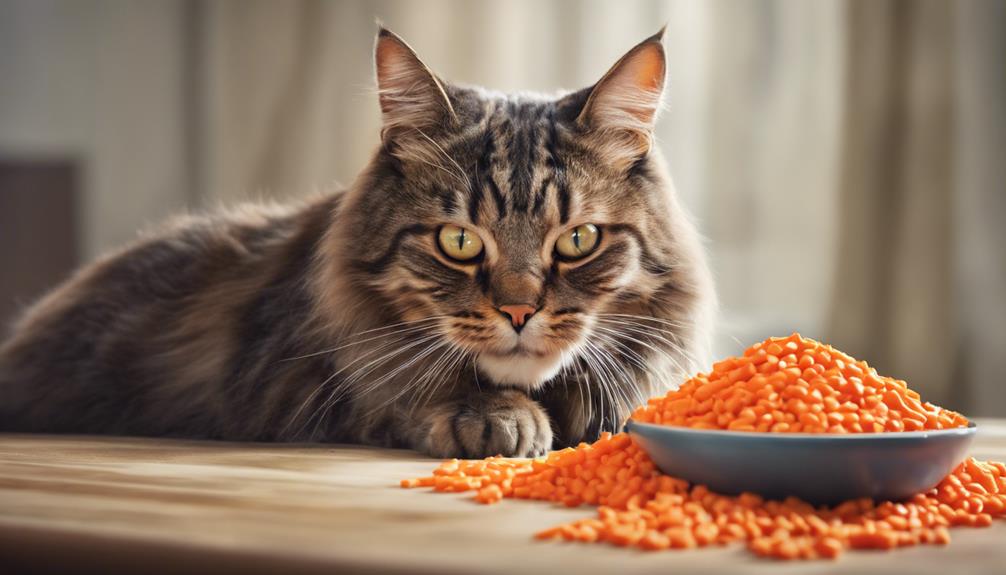Cats can enjoy pineapple in moderation. Portion control is key to prevent digestive issues and weight gain. Remove skin, core, and seeds before offering it. Too much fiber can lead to upset stomachs, so balance it with other nutrients. Cats may not be into the sweetness of pineapple, preferring amino acids. Consult a vet first to address any health concerns. Consider individual dietary needs and watch for vomiting or loose stools. Cats might find pineapple intriguing, but some may not fancy it. Stay tuned to discover more about cats and pineapple.
Key Takeaways
- Consult a vet before feeding pineapple to cats for dietary advice.
- Remove skin, core, and seeds to prevent choking hazards.
- Introduce pineapple gradually to monitor for any digestive issues.
- Cats may not be interested in pineapple due to limited sweetness perception.
- Excessive pineapple can lead to vomiting and diarrhea; moderation is crucial.
Pineapple Safety for Cats
Ensuring the safety of cats when consuming pineapple requires careful consideration of portion sizes and preparation methods. While pineapple is generally important for cats to eat in moderation, it's essential to avoid feeding them large quantities to prevent digestive issues and weight gain. Although cats don't necessarily need extra Vitamin C in their diet, the high fiber content and essential vitamins found in pineapple can offer additional health benefits for our feline friends.
To keep our cats safe and healthy, it's vital to avoid feeding them pineapple skin, leaves, or sugary syrups, as these can lead to digestive problems. Properly preparing fresh pineapple by removing the skin, core, and seeds is crucial in preventing any digestive issues in cats. By following these guidelines and offering pineapple as an occasional treat in small, appropriately sized pieces, we can ensure that our beloved cats enjoy this tropical fruit safely.
Fiber Concerns for Cats

When considering the fiber content in pineapple for cats, moderation is vital to prevent potential digestive issues. Too much fiber from pineapple can lead to digestive disturbances like vomiting or loose stools in our feline friends. Balancing the fiber intake from pineapple with other nutrients in a cat's diet is essential for their overall well-being. We must be mindful of the amount of pineapple we offer our cats to avoid gastrointestinal upset and keep them happy and healthy.
To help you understand better, here's a handy table outlining the key points about fiber concerns for cats:
| Fiber Concerns for Cats | |
|---|---|
| Excessive Fiber Intake | Gastrointestinal Upset |
| Moderation | Prevent Digestive Issues |
| Balanced Diet | Avoid Disturbances |
| Veterinary Consultation | Signs of Fiber-related Problems |
Sweetness Preference in Cats

Cats exhibit a limited sensitivity to sweetness due to their evolutionary diet as obligate carnivores. Unlike humans, who've a strong affinity for sweet treats, cats have fewer taste receptors that respond to sweetness.
Their preference for meat-based diets influences their taste buds, which are more attuned to detecting amino acids and proteins present in meat rather than sugars like those in pineapple. This genetic predisposition means that cats may not show much interest in sugary foods like pineapple.
As carnivorous hunters, cats have evolved to prioritize meat over sweet fruits. So, if you offer your feline friend a taste of pineapple, don't be surprised if they show little enthusiasm. Their unique taste receptors and carnivorous nature play a significant role in shaping their sweetness preferences.
Understanding this aspect can help you make informed decisions about what treats to offer your cat, ensuring their dietary needs align with their natural instincts as carnivores.
Consultation With Veterinarian

Before sharing pineapple with your feline friend, it's crucial to consult a veterinarian to verify its safety. Vets can evaluate any potential health risks, allergies, or dietary considerations specific to your cat. Seeking their expert advice is essential to keep your cat healthy and happy when introducing new treats like pineapple.
Consulting a veterinarian ensures that you are making informed decisions regarding your cat's diet and overall well-being. They can provide personalized guidance based on your cat's individual needs and health status. Remember, a veterinarian's input is invaluable in promoting the health and happiness of your furry companion.
Vet Approval Necessary
For ideal feline health, consulting a veterinarian is essential before introducing pineapple into a cat's diet. When it comes to our furry friends, seeking vet approval is vital to guaranteeing their well-being. Below is a helpful table summarizing why vet approval is necessary before giving cats pineapple:
| Why Vet Approval is Necessary | Explanation | Benefits |
|---|---|---|
| Cat's Health | Ensures pineapple is safe for your cat | Promotes overall well-being |
| Tailored Advice | Helps determine the right amount for your cat | Prevents potential health issues |
| Medication Interactions | Identifies any risks with medications | Keeps your cat safe |
Relying on your vet's expertise ensures that your beloved cat enjoys pineapple in small amounts without any worries.
Potential Health Risks
Upon consulting a veterinarian, one can uncover potential health risks associated with introducing pineapple into a cat's diet. While pineapple is generally safe for cats to consume in small pieces, it's important to recognize that the high sugar content may not be suitable for all feline friends.
Veterinarians can advise on the appropriate portion sizes to prevent weight gain and digestive issues. Additionally, they can help identify any allergies or adverse reactions that cats may have to pineapple.
Individual Dietary Needs of Cats

Cats have unique dietary needs that depend on factors like age, weight, activity level, and health conditions. Considerations such as food allergies, sensitivities, and intolerances play an important role in determining what a cat should eat. Specific nutrients such as taurine, arachidonic acid, and preformed vitamin A are essential for a cat's overall well-being.
Cats Unique Diet
What dietary requirements make cats unique among animals? Cats have specific nutritional needs due to being obligate carnivores. Their diet must include high levels of animal-based proteins, taurine, and essential vitamins like A and D. Unlike humans, cats require a source of vitamin C from their diet as they cannot produce it internally. When selecting food for cats, it's important to choose small, safe options that cater to their carnivorous nature. To highlight this further, here's a breakdown of a cat's unique diet:
| Nutritional Requirement | Importance |
|---|---|
| High Protein Levels | Essential for muscle function and overall health |
| Taurine | Critical for heart and eye health |
| Vitamin A and D | Necessary for vision, immune function, and bone health |
Nutritional Requirements for Cats
Considering the specific dietary requirements of cats as obligate carnivores, their individual nutritional needs must include high levels of protein and essential amino acids. Taurine, for instance, is an important amino acid crucial for supporting heart and eye health in cats.
These feline friends require a diet rich in animal-based proteins to thrive, as their digestive systems aren't optimized for plant-based proteins like those of humans or omnivores. Additionally, cats need specific vitamins and minerals such as Vitamin A, Vitamin D, calcium, and phosphorus to maintain healthy bones, vision, and overall well-being.
Ensuring that cats receive a balanced diet formulated to meet their unique nutritional needs is essential in preventing health issues and deficiencies, promoting their longevity and well-being.
Feeding Guidelines for Cats
Understanding the diverse dietary requirements of felines is essential for tailoring feeding guidelines to meet their individual needs effectively. When considering a cat's feeding guidelines, it's important to remember:
- Cats have specific taste preferences and may need time to adjust to new foods rich in essential vitamins and nutrients.
- Consulting with a veterinarian helps in creating a feeding plan that addresses any health concerns and guarantees a balanced diet for your feline friend.
- Portion control is key in maintaining your cat's weight and overall health, so monitoring food intake and adjusting as needed is critical for their well-being.
Potential Vomiting From Pineapple

Cat owners should be aware that excessive consumption of pineapple can potentially lead to vomiting in their pets due to the fruit's high natural sugar content. Cats, with their sensitive stomachs, may experience gastrointestinal upset and vomiting if they indulge in too much pineapple at once.
The high sugar content in pineapple can trigger this reaction as their digestive system processes the sweetness and fiber. It's important to keep an eye on your cat's pineapple intake to prevent any vomiting episodes and secure their overall well-being.
If you notice your feline friend showing signs of vomiting after enjoying some pineapple, it's best to seek guidance from a veterinarian on managing their diet. Remember, moderation is key when it comes to introducing new foods like pineapple to your cat's diet to avoid any unwanted tummy troubles.
Stay vigilant, and your cat will thank you for it!
Loose Stools Risk

After acknowledging the potential vomiting risk linked to feeding cats pineapple, it's important to highlight that the high fiber content in pineapple can escalate the chances of loose stools in felines. When considering whether cats can eat pineapple, it's vital to be aware of the potential risks associated with digestive upset.
- Introduce Pineapple Gradually: Slowly incorporating pineapple into your cat's diet can help their digestive system adjust to the new fiber content, reducing the likelihood of loose stools.
- Monitor for Digestive Issues: Keep a close eye on your cat after feeding them pineapple. Watch for signs of gastrointestinal upset such as diarrhea, which may indicate that pineapple doesn't agree with your feline friend.
- Limit Pineapple Intake: Avoid overfeeding pineapple to your cat. Large quantities can lead to loose stools and discomfort, so moderation is key in preventing digestive issues when offering this tropical fruit to your pet.
Cats Interest in Pineapple

Some cats may find the texture and aroma of pineapple intriguing, sparking their curiosity or playful nature. While not all felines are drawn to the sweet flavor, individual preferences can vary.
Understanding cats' interest in pineapple can help us explore their compatibility with this fruit, potential health benefits, and safe feeding practices.
Cats and Pineapple Compatibility
While exploring new textures and flavors, we noticed that cats may display an interest in pineapple due to its intriguing characteristics. Here are three reasons why cats might find pineapple appealing:
- The succulent texture of pineapple can provide a revitalizing change for cats seeking moisture in their foods, adding a new element to their diet.
- Some cats enjoy chewing on pineapple leaves out of curiosity or for entertainment, showcasing their natural curiosity and playful behavior.
- Cats may be influenced by their human family members and mimic their behavior, including trying out different foods like pineapple. This shared experience can create a bonding moment over a shared snack.
Cats' interest in pineapple can be a delightful exploration of flavors and textures in their diet.
Health Benefits for Cats
Pineapple offers potential health benefits for cats, including essential nutrients like manganese, folate, copper, and vitamin B6. These vitamins are important for a cat's overall well-being.
Some cats may even show interest in chewing on pineapple leaves, displaying curiosity towards this tropical fruit. The fiber found in pineapple can also aid in digestive health for cats when given as an occasional treat.
While cats are carnivores, the moisture content in pineapple can help with their hydration levels. It's essential to remember that moderation is key when introducing new foods to your feline friend. Providing pineapple in small amounts can be a tasty and nutritious addition to their diet, supporting their health in various ways.
Safe Feeding Practices
Our feline companions' curiosity towards certain foods can vary, making it crucial to observe their individual preferences when considering introducing pineapple into their diet. When it comes to feeding cats fresh pineapple, it's vital to follow safe practices:
- Balance with cat food: Make sure that pineapple is given as an occasional treat and not a substitute for balanced cat food to meet their nutritional needs.
- Rich in vitamins B6 and C: Fresh pineapple contains these essential vitamins that can be beneficial for your cat's overall health when given in moderation.
- Moderation is key: While fresh pineapple can offer some health benefits, too much can lead to digestive issues, so always feed in moderation and consult your vet for guidance.
Health Conditions Impacting Diet

Considering various health conditions impacting a cat's diet, it's essential to be mindful of how pineapple may affect their well-being. Cats with digestive issues may struggle with pineapple consumption, leading to potential discomfort or upset stomachs.
For cats with specific dietary restrictions, like those with diabetes, the sugar content in pineapple could pose risks to their health. Similarly, cats with kidney problems may find it challenging to process the nutrients in pineapple, making it less suitable for them.
Additionally, felines with gastrointestinal sensitivities might experience adverse reactions to pineapple, such as vomiting or diarrhea. Weight management is another pivotal factor to contemplate, as the sugar content in pineapple could hinder efforts to regulate a cat's weight.
Consulting a veterinarian is paramount to determine if pineapple is safe for cats with these health conditions, ensuring their diet supports their overall well-being.
Cautions With Pineapple Consumption

When considering feeding pineapple to your feline friend, it's important to be cautious due to potential digestive issues and allergic reactions that cats may experience.
Large amounts of pineapple could lead to vomiting or diarrhea, while the skin, leaves, and sugary syrups should be avoided to prevent weight gain.
Ensuring moderation and a gradual introduction to pineapple can help keep your cat healthy and happy.
Digestive Issues in Cats
How can pineapple consumption potentially affect a cat's digestive system?
Feeding felines pineapple can lead to digestive issues such as vomiting and diarrhea. Here are some cautions to keep in mind:
- High in Fructose: Pineapple is high in fructose, which can be challenging for cats to digest, potentially causing gastrointestinal upset.
- Monitor Portion Sizes: Cats shouldn't consume excessive pineapple to prevent digestive problems and potential weight gain.
- Avoid Certain Parts: Pineapple skin, leaves, or sugary syrups should be avoided as they're difficult to digest and can lead to health issues.
Being careful with pineapple consumption is essential to prevent digestive problems in our beloved feline friends.
Allergic Reactions in Cats
Let's be vigilant about potential allergic reactions in cats due to pineapple consumption. While some felines may enjoy the taste of pineapple due to their sweet taste receptors, it's vital to monitor them for any signs of allergic reactions.
Symptoms like vomiting, diarrhea, or skin irritation could indicate an allergy to this fruit. If your cat shows discomfort after eating pineapple, it's important to consult a veterinarian promptly. Allergic responses can vary from mild to severe, requiring medical attention.
Remember to introduce new foods gradually and observe your cat closely for any adverse reactions. Ensuring that your furry friend's diet consists of safe foods is paramount in maintaining their health and well-being.
Tailored Dietary Recommendations

For personalized dietary recommendations for your cat, consult a veterinarian to guarantee their specific needs and health conditions are taken into consideration. When it comes to your feline friend's diet, personalized advice can make a world of difference. Here's what you can expect when seeking tailored dietary recommendations:
- Personalized Approach: A veterinarian will create a customized diet plan for your cat based on factors like age, weight, activity level, and any health issues they may have. This tailored approach ensures your cat gets the nutrients they need.
- Safety and Moderation: Veterinarians can offer guidance on safely introducing new foods like pineapple into your cat's diet. They'll recommend moderation to prevent any digestive upsets.
- Considering Preferences: Your vet may suggest alternatives to pineapple if your cat doesn't seem interested or has specific nutritional requirements. By considering your cat's preferences, they ensure a diet that your cat will enjoy and benefit from.
Trusting the expertise of a veterinarian can help you provide the best diet for your beloved cat.
Understanding Cat Preferences

We observe various cat preferences when it comes to their food choices, including their reactions to fruits like pineapple. Cats, being carnivores, may not taste sweet flavors like pineapple as appealing as humans do. However, some felines might enjoy the texture and moisture of fruits like pineapple, while others may not show much interest. Understanding your cat's unique preferences is key. If you want to introduce pineapple to your cat, make sure your cat tries just a little bit at first to see how they react.
Here's a helpful table to summarize cat preferences towards fruits like pineapple:
| Cat Preference | Description |
|---|---|
| Likes Pineapple | Shows interest in texture/moisture |
| Dislikes Pineapple | Shows no interest or dislike for sweet taste |
| Curiosity | Might be curious about appearance/leaves of pineapple |
| Individuality | Each cat has its own unique food preferences |
| Introduction | Start with a small amount to gauge reaction |
Understanding these preferences can guide you in providing suitable treats for your feline friend.
Pineapple and Digestive Issues

Discussing the potential impact of pineapple on cats' digestive systems reveals important considerations for pet owners. When it comes to feeding your cat pineapple, it's vital to be aware of how it can affect their stomach. Here are some key points to keep in mind:
- Vomiting and Diarrhea: Feeding cats large amounts of pineapple can lead to digestive issues like vomiting and diarrhea, which can be distressing for both the cat and the owner.
- Lactose in Pineapple Yogurt: Cats may struggle with lactose in pineapple yogurt, causing gastrointestinal upset. It's crucial to monitor their reaction to dairy products containing pineapple.
- Obesity Risk: Overconsumption of pineapple can result in obesity due to its high sugar content. Be mindful of the quantity of pineapple treats to prevent weight-related health issues.
Moderation in Pineapple Feeding

When considering cats' diet, it's important to highlight the significance of offering pineapple in moderation to prevent potential health issues.
While a cat enjoys the occasional sweet treat, it's vital to remember that pineapples should be given in small slices to avoid digestive problems and weight gain.
Incorporating pineapple into their diet as an occasional snack rather than a staple meal is key to maintaining their overall health.
Monitoring Cats Reaction

Upon introducing pineapple into a cat's diet, it's important to monitor their reactions for any signs of digestive issues or behavioral changes. Cats, being small animals, may not be accustomed to sweet foods like pineapple, so it's essential to watch for any adverse effects.
Here are three key points to keep in mind when monitoring your cat's reaction to trying pineapple:
- Watch for Digestive Issues: Keep an eye out for symptoms such as vomiting or diarrhea, as these could indicate that your cat is having difficulty digesting the pineapple.
- Observe Behavior Changes: Pay attention to any shifts in your cat's behavior or appetite after trying pineapple. Any unusual behavior could be a sign of discomfort or dislike.
- Control Pineapple Consumption: Make sure that your cat consumes pineapple in moderation. Overconsumption can lead to potential health issues, so it's important to limit their intake.
Frequently Asked Questions
Are Pineapples Toxic to Cats?
Pineapples are not toxic to cats. They can enjoy them in moderation. Some cats may not love the sweet taste or can have digestion issues if they eat too much. Always consult a vet for dietary advice.
What Fruits Can Cats Not Eat?
We should be cautious feeding our feline friends fruits like blueberries, cantaloupe, pears, apricots, watermelon, grapes, raisins, and citrus fruits. These can cause digestive issues and even kidney failure. Let's keep our furry pals safe and healthy!
Can Cats Eat Pineapple Pizza?
We shouldn't feed cats pineapple pizza due to ingredients like cheese, tomato sauce, onions, or garlic that can harm them. Stick to cat-friendly foods to keep our feline friends healthy and happy. Let's prioritize their well-being.
Can Cats Have Pineapple Popsicle?
We avoid giving cats pineapple popsicles due to high sugar content leading to health issues like obesity. Artificial sweeteners in popsicles can be toxic. Cats' digestion may not handle dairy well. Fresh pineapple is a safer treat.
– Can Giving Cats Pineapple Affect Their Attachment to Their Favorite Person?
According to a study, giving cats pineapple does not affect their attachment to their favorite person. The study found that cats are more independent and not as emotionally bonded to individuals as dogs are. So, feeding them pineapple should not have any impact on their bond with their favorite person.
Conclusion
To wrap up, while cats can technically have pineapple, it's best to approach this tropical fruit with caution. Keep an eye on fiber content, sweetness levels, and any potential digestive issues. Seek advice from your veterinarian to make sure you're meeting your cat's individual dietary needs.
Remember, moderation is key when it comes to introducing new foods to your feline friend. So, go ahead and offer a tiny taste of pineapple, but always monitor their reaction closely. Stay informed and keep your kitty happy and healthy!









